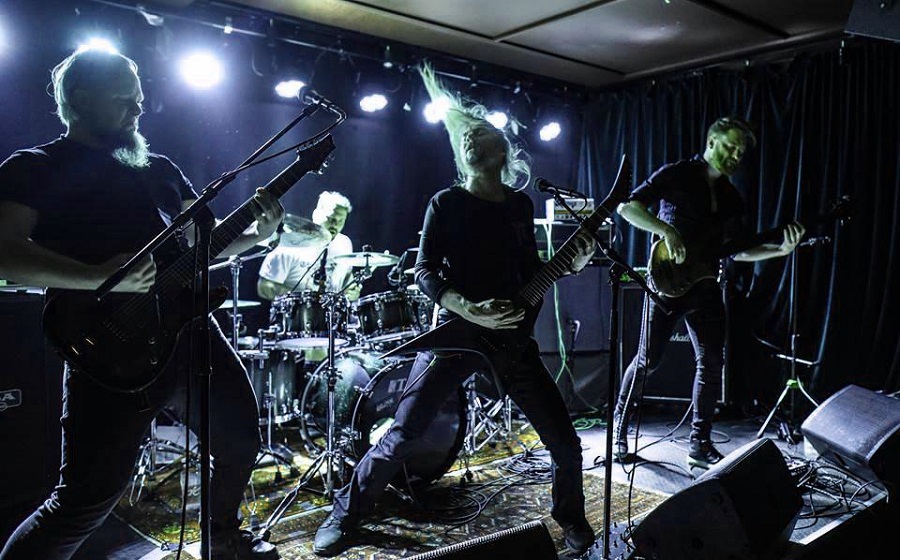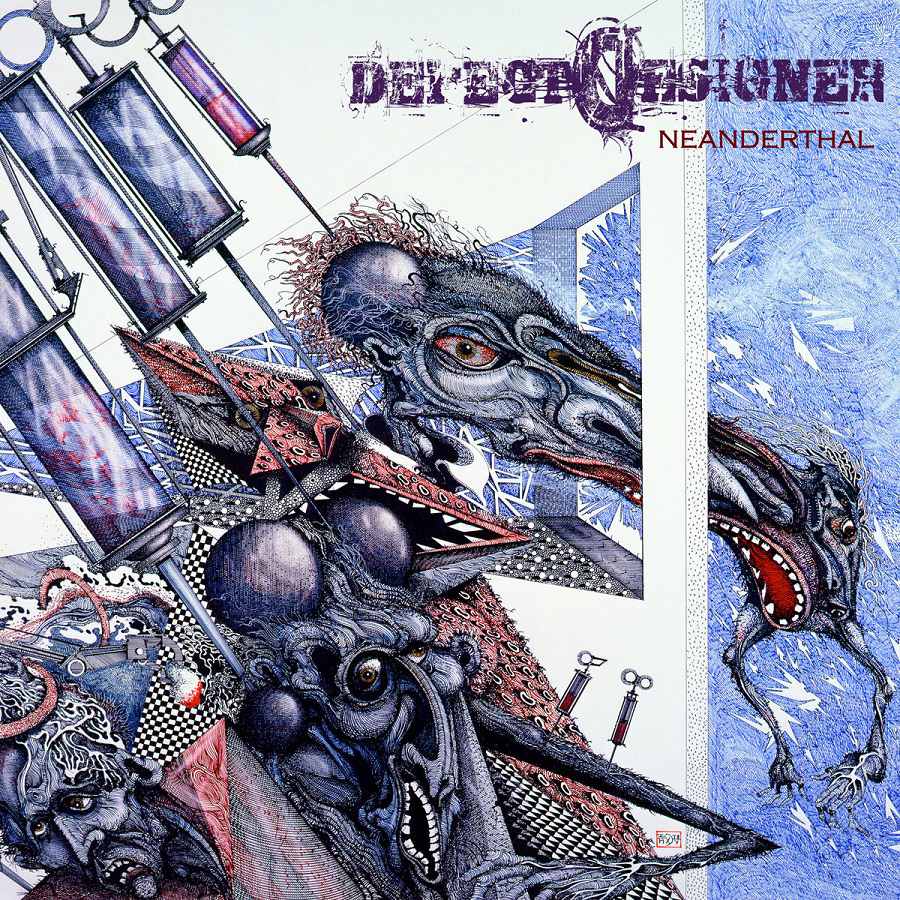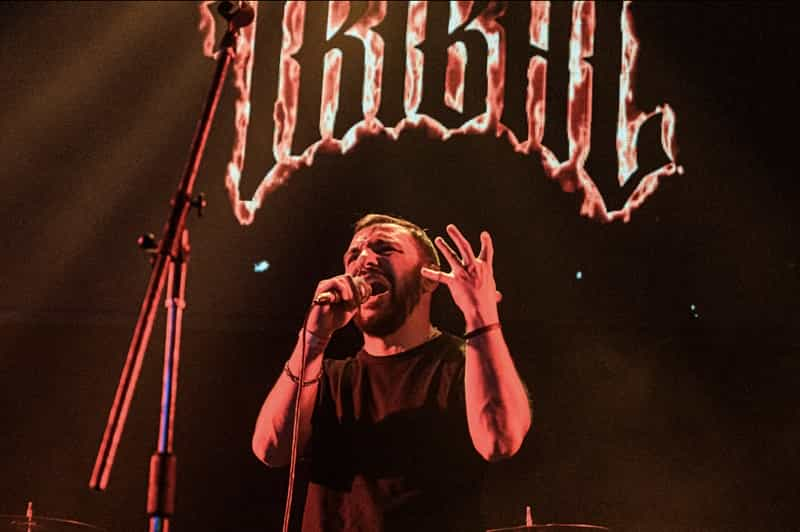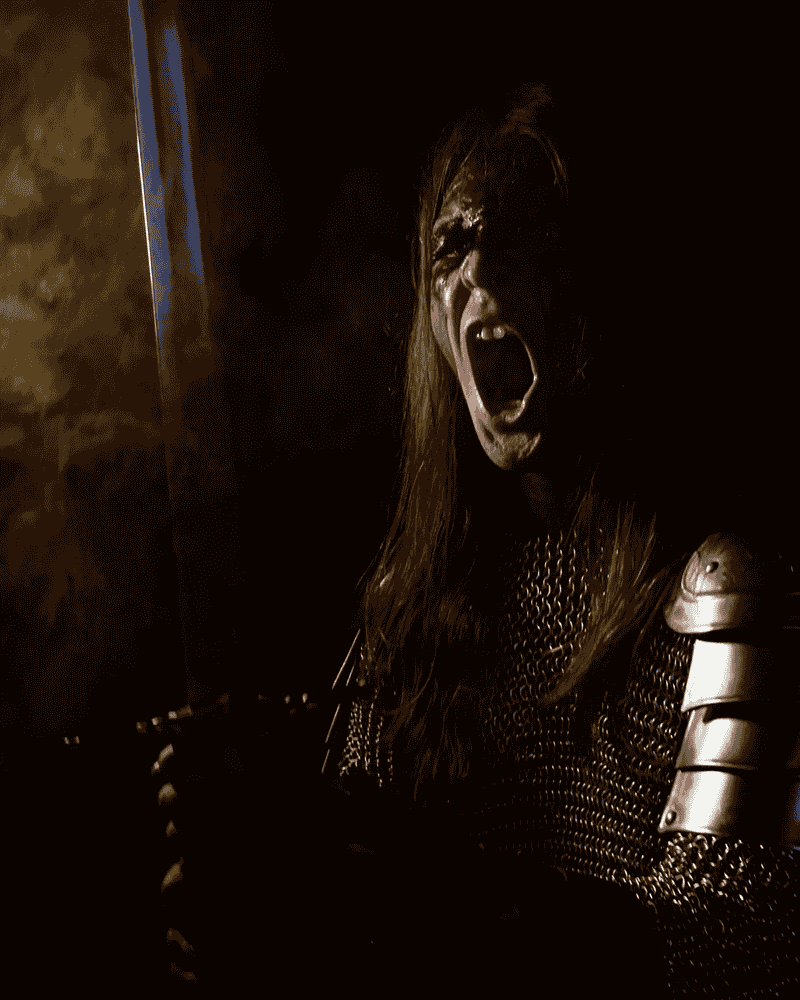#DefectDesigner 🇷🇺 #Interview

Defect Designer plays a style of death metal that might sound out of control if it weren’t so tightly played. Combining grindcore and progressive elements, the band sounds not quite like anything else.
The latest promo materials list the band as Eyvind W. Axelsen – slapping, sliding and proofreading, Simen Kandola – fast and furious beating, Dmitry Sukhinin – writing notes, plucking strings and roaring, Martin Storm-Olsen – plucking strings, additional shouting, occasional karaoke, proofreading, electrical sound recording, mouse clicking, dog provisioning. Well, you can decide what that means.
With a new mini-album — Neanderthal — due out on Transcending Obscurity Records on the 8th of July I caught up withDmitry and Martin to learn more about the band.
Thanks for agreeing to this interview for Blessed Altar Zine,
Dmitry (D): Hi Tom and everyone! Thank you very much for your time and for checking us out!!
Martin (M): Likewise, thank you for the opportunity!
You’ve got a new mini album — Neanderthal — due for release in July. What was the process like making the record and how happy are you with the result?
D: It was a different approach compared to the previous work. First of all, there was no studio booked for the actual recording this time. Having no studio and no time pressure is a great feeling. The main result is that we have much less editing on the recording and I am much more happy with the vocals. Speaking about the vocals, the previous recordings were quite challenging. On Wax, we have not rehearsed for 3 months before entering the studio due to studies and exams in the university. I had cracked my vocals immediately, and the session was far from perfect. On Ageing Accelerator, there was no live band, – so there was no vocal practice. I was coming to a rented place just to scream to have some shape. Again, in the studio the vocals got cracked immediately. With Neanderthal – it is a completely different story. Much better shape for vocals and we had a chance to redo takes that could have been there, but had not felt perfect.
On Neanderthal we did record drums in our rehearsal space – luckily, our Martin is a sound engineer and runs a Sounds of O Studios. We did drums in 3-4 days, then took time to do guitars and bass at home, and did vocals in Martin’s studio. Martin did all the engineering work and then we mastered the stuff with Finnvox.
M: I have been working with various degrees of audio engineering for years before this release, but for a long time I took the musician’s and producer’s chair and let others do the engineering and mixing. To do decent home recordings wasn’t that new to me, but it was my first time doing the producer role to this extent, going all the way from sketches throughout the recording process and into the sound design. My company Sounds of O Studio was a name I already had in mind, but it sort of spun out of this release as an actual existing offer for mixing and engineering, a lot thanks to the success of the process.
We had a focus on recording performance quality over perfect sound quality, which is something I strongly believe in myself. It was particularly important for the vocals, where it’s important to remove any part of the recording process that involves tension. We knew from before that Dmitry was more comfortable having a hand-held microphone for recording vocals, and I truly believe sticking to that did a lot for the vocals to sound so aggressive with such ease to top off the recording.
It’s been seven years since the band’s last album — Ageing Accelerator — what have the band members been up to between then and this new release?
D: With Ageing Accelerator we have not had a live band. I came to Norway in 2012, found a line-up here, but it dissolved right before the recording. So I had to try to find and book musicians. It was great luck to get Flo Mounier on drums and then Spiros, who had been preparing the artwork, suggested his brother Christos. Christos did orchestration, but also arranged the studio in Athens and introduced me to Stelios who did guitars. When I came back from Athens’ studio with recorded vocals and bass, we added some more guitars with Martin (whom I had met just recently) and added a few vocal lines. So, basically, there was no functional “unit”.
In 2015 I joined Diskord, and most of the time we spent composing the stuff for the upcoming Defect Designer and Diskord releases. Defect Designer ended up doing an EP, and now we have material worth for 2 albums demoed that we will start recording soon. Diskord also did a record that is out. Neanderthal was ready in 2020, but due to Covid, life was put on pause – very demoralizing. We really did follow rules responsibly, and had not seen each other much, when social interaction was forbidden.
Pandemic seemed to be a challenge and quite demoralizing, as there also is a job uncertainty attached to it.. But seeing how life develops now after 24th of February, I would say, I miss the corona times.
M: We spent a lot of time getting Defect Designer up and running, basically, but I also started playing bass with Vingulmork in the time between these two releases, and took part in their latest release Avgrunn EP from 2019 where I also took a producer role with our mix engineer after doing the editing part of the sound engineering on the completed recording multitracks myself.
There’s plenty of recording experience between the band members. Were there any new techniques or recording methods you put into this new release?
D: Actually, I have started recording guitars not so long ago: the first was the fastroce band Märesvin, and now Diskord and Defect Designer. Compared to how we did it before, we definitely need much less editing now and recording riffs or bigger parts of the song in full, gives a much better human feeling, plus improves the playing. With Märesvin I did songs in full, but Defect Designer and Diskord are quite difficult to pull out perfectly on the recording. So, essentially, we use more time for the recording – ability to have time allows us to use time and understand, if some moments are imperfect and will haunt you later. This helps to revisit the songs/riffs after a few days – I would say, this is the main difference.
As for the recording itself, we used Kempers to do guitars at home and Eyvind (also in Diskord) recorded at home and provided Martin with tracks and clean tracks in case we needed reamping. Speaking about guitars, even though Kemper gave us an opportunity to do reamping, we used the same amps/racks as we recorded on – same sound on recording ended up being released. Reamping can help, but it also has limitations and when you are playing, you are adjusting to the sound you have now. So better have it good from the start.
M: I’d like to think the “secret sauce” was to work as comfortably as possible while still pushing each other to max out our potential. That’s where “reviewing” came in. Dmitry and I did most of the guitars together, allowing us to review each other’s performances. Out of practicalities, as we did recording sessions on the side of keeping full time jobs, the sessions were short and many, rather than long bulks, which I think was also a benefit for us, allowing us to keep proper focus when recording. And yes, we used profiled amps through a Kemper, but like Dmitry says, when you start getting gritty with the play technical details to the level we had to, it was important to choose a sound that we trusted from the very beginning since sound and performance are quite closely linked. We stuck with a set of two amp setups for two specific guitars to keep consistency throughout the album.
The musicianship on the new release is mind bending at times. Who has the toughest job playing these tracks and were there any especially challenging songs to record?
D: Haha, hard to say, who has the most challenging task. To me – the drummer. As for guitars, “Trolls” needed to be very tight, and it has really fast rhythm guitars. “Time, Forward” is music composed by Georgiy Sviridov, and it is not that easy to play the leads.
M: Although we’ve learned that the guitars are doable in retrospect I don’t think there were any particularly easy jobs during the recording sessions. There was always something to look after to ensure we got the right take for all of us. However, I must agree that the drums were a massive effort on this album. Hats off to Simen for his performance. And how he endured recording while Dmitry and I pushed him to “invent” and perform at the same time from beginning to end of the course of a long weekend in the rehearsal room.

The artwork for the new release is also great. You brought in Ian Miller — who’s done great work for Bolt Thrower and Ulthar — how did that collaboration come about?
D: I bumped into Ian’s works some time ago: it is the moment when you scroll, see the picture and then cannot stop staring at it. Being in another world while looking at the picture is the feeling I want to have – some other reality. We had a cover artwork by another artist that I really liked, but our label suggested we try Ian, – and it worked out. We have selected a work and agreed on usage. Ian is fascinating, it is not easy to choose from a variety of works he has done.
The band started out in Russia. How did you come to make Norway your home and what was the most difficult adjustment?
D: Playing in a band in Russia was not easy 10 years ago, – even concerning access to equipment, but also the logistics to go to play shows is a real challenge. Fewer musicians, cliches and in general lower interest in the music – all that does not help.
I relocated 10 years ago and never regretted or missed anything for a split second. It is basically relocating to a place where you and your family can have a future from a place that won’t have any. Knowledge that what you have earned won’t drop in value several times overnight just because of some political decisions that never have people in mind.
I cannot think of anything difficult when it comes to adjustment – literally everything is easier. But with the relocation.. Well, local culture is different, but it is quite welcoming. Diverse and sometimes inclusive. Yes, you have a different name and the locals are not as direct as Russians, but, well, so what?
So, not sure about the difficulties, – apart from the logistics – if I want to visit my home town again now – it is much harder than during the covid times.
Two of the band’s members also feature in Diskord. How would you separate the music of that project with Defect Designer?
D: The bands are quite different and approach things very differently. Starting from the tuning to song-writing, way of recording. What is common is that we try to make music, that,we hope, is interesting to listen. Same time, to be frank, there have been riffs that could be used for both bands, but due to the recording approach of different bands, they sound very different. So, if Defect Designer and Diskord would record the same riff, – they would sound very different.
Defect Designer is more focused on the groove and melodies. Same time, we have two guitars that give space to make chaotic places really chaotic.
M: In Defect Designer I’m also contributing with songs, riffs and reviewing, which I assume may add a flavor which is different from the key values and focus than what goes into a Diskord-song.
Who else’s music have you been enjoying listening to recently?
D: Catchy mainly. Easy-listening stuff with groove. I have discovered WASP, – only recently. Ozzy’s stuff, Rammstein – lately. Witherscape, Pink Floyd, Savatage, Vangeli, Michael Jackson, Thomas Newman… Well, it seems like lately (last month) Defect Designer has been the heaviest thing I’ve been listening to.
M: Oh, there’s been a lot, really. I am all over the place. Recently I’ve played a lot of Whitechapel, Machine Head, Nordjevel, Mastodon, Jinjer, Soen, Twelve Foot Ninja and then I’m sorry to all of the bands I do listen to a lot lately that weren’t top of mind.
Are there plans for live shows to promote the new release?
D: I think we will be jumping into the first full-length recording very soon. I mean, first out of two releases we have composed/demoed so far.
Finally, is there anything else you’d like to mention or promote?
D: It is great that you have reached this point of the interview! Our record Neanderthal will be out in different formats 08th of July 2022. It is extra important for us and the label to get things rolling and the best way to ensure it is to preorder our album here. Vinyls should look spectacular, and there will be loads of merch and other formats as well!
M: Dmitry sums it up great. The vinyls and the overall design looks amazing. If the end result is anything near that it’s going to be a jem. Having a dual role here, as both band member and engineering and mix engineer I could mention that you should look out for future Defect Designer works but also activity coming out of Sounds of O Studio.
Thanks for your time
D: Thank you! Blast our stuff loud!
M: Appreciate the time given. Stay heavy!
interview by Tom Osman
Pre-order Neanderthal on Transcending Obscurity Records now on the links above or below and follow the band on social media to keep up to date.
Label
Site
Facebook
Bandcamp
Instagram
Twitter
YouTube
Store EU
Store US
**Please support the underground! It’s vital to the future of our genre**
#WeAreBlessedAltarZine
#TheZineSupportingTheUnderground


